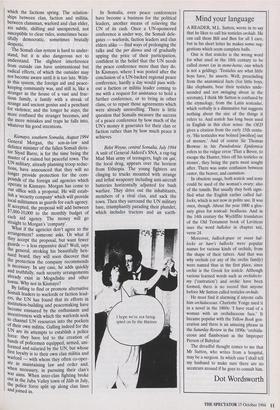Mind your language
A READER, M.L. Sutton, wrote in to say that he likes to call his testicles orchids. He can call them Bill and Ben for all I care, but in his short letter he makes some sug- gestions which seem complete balls.
One is that testicles is the wrong word for what used in the 18th century to be called stones (as in stone-horse, one which is not a gelding). 'Testicles are what little boys have,' he asserts. Well, prescinding from the anatomical facts (for little boys, like elephants, bear their testicles unde- scended and not swinging about in the scrotum), I think Mr Sutton is confused by the etymology, from the Latin testiculus, which verbally is a diminutive but suggests nothing about the size of the things it refers to. And testicle has long been used in English in this clear sense: the OED gives a citation from the early 15th centu- ry, 'His testicules war bolned [swollen] out of mesure.' And of course Sir Thomas Browne in his Pseudodoxia Epidemica refers to the vulgar error 'That a Bever, to escape the Hunter, bites off his testicles or stones', they being the parts most sought after. There was some confusion between castor, the beaver, and castration.
In obsolete usage, both testicle and testis could be used of the woman's ovary; also of the tonsils. But usually they both signi- fied what the English earlier called bal- locks, which is not now in polite use. It was once, though. About the year 1000 a glos- sary gives for testiculi: beallucas. And in the 14th century the Wycliffite translators of the Old Testament book of Leviticus uses the word ballokes in chapter xxii, verse 24.
Moreover, ballock-grass or sweet bal- locks or hare's ballocks were popular names for various kinds of orchids, from the shape of their tubers. And that was why orchids (or any of the orchis family) were named thus in the first place, since orchis is the Greek for testicle. Although various learned words such as orchidecto- my (`castration') and orchic have been formed, there is no record that anyone before Mr Sutton called testicles orchids.
He must find it alarming if anyone calls him orchidaceous. Charlotte Yonge used it in a novel in the 1860s: 'I have read of a woman with an orchidaceous face.' It became popular with the Yellow Book gen- eration and there is an amusing phrase in the Saturday Review in the 1890s: `orchida- ceous and flamboyant as the Improper Person of Babylon'.
The dreadful thought comes to me that Mr Sutton, who writes from a hospital, may be a surgeon. In which case I shall tell my husband to make sure there are no secateurs around if he goes to consult him.
Dot Wordsworth


























































 Previous page
Previous page